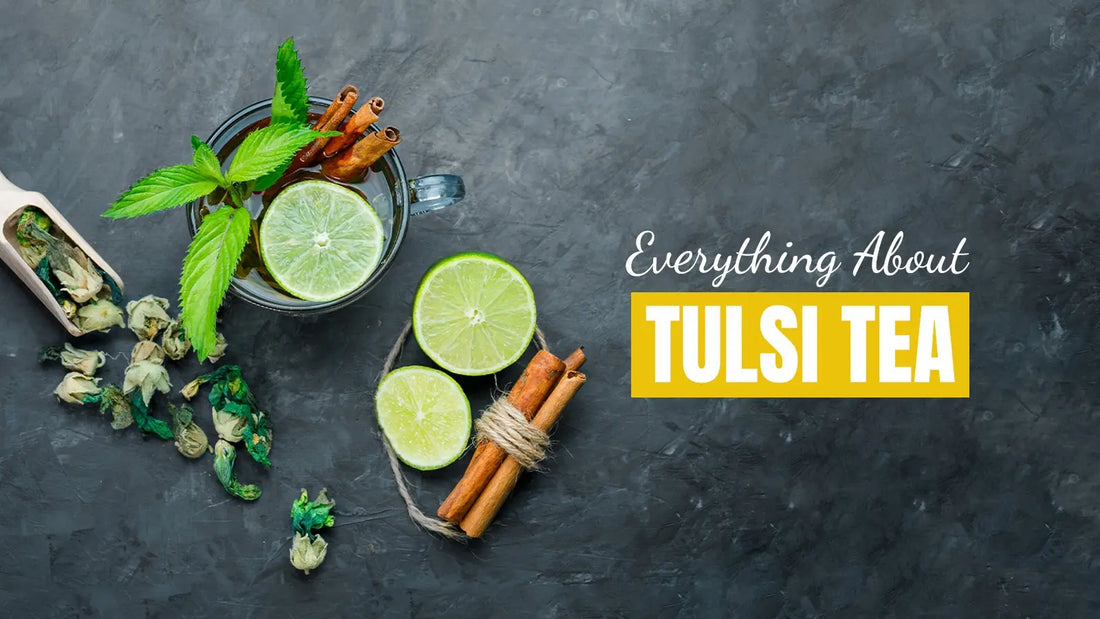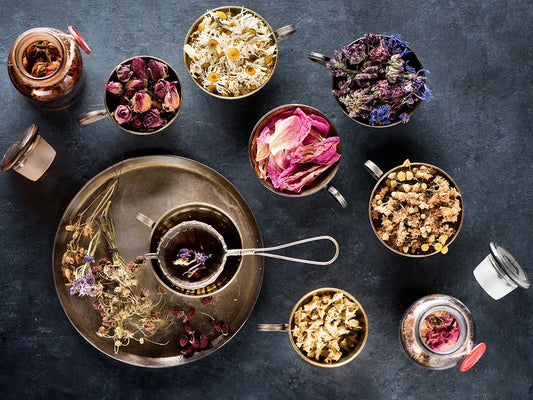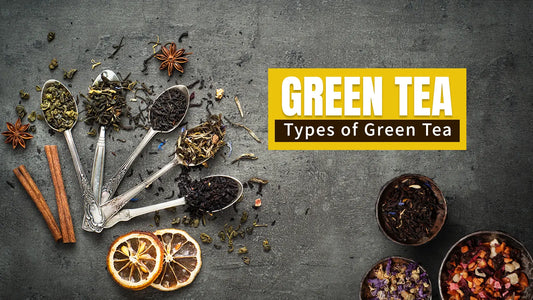Tulsi Teas: Everything You Need to Know

If you’re looking for a tea that not only delights your taste buds but also offers many medicinal benefits, try tulsi tea. Also, regarded as the “Elixir of Life,” tulsi tea is packed with abundant vitamins and minerals, making it one of the best herbal teas.
In this article, we will guide you through everything you need to know about tulsi tea. Get ready to discover the secrets behind this legendary tea.
What is tulsi tea?
Tulsi, commonly known as holy basil, is derived from the Ocimum Tenuiflorum plant. So, tulsi herbal tea consists of dried tulsi leaves.
Originating from Indian culture, tulsi tea is appreciated for its medicinal properties and potential health benefits.
What does tulsi tea taste like?
Tulsi tea commonly has earthy, minty, lemony, sweet, or slightly spicy notes. This tea gives off an astringent flavor. But, the taste profile relies on the tulsi type. Or, when the tea is blended with other spices/flavors.
Variants of Tulsi Tea
Krishna Tulsi Tea
Krishna tulsi tea is a kind of holy basil with purple leaves. People also know it as purple-leaf tea or Shyama tulsi.
It has a slightly spicy, peppery, earthy, and crisp taste. You’ll get the aroma of mint and basil, with a cinnamon and clove undertone. When you drink this tea, you’ll experience a cooling and refreshing effect.
Vana Tulsi Tea
Vana tulsi is also a type of holy basil, having light green leaves. This tea has a very refreshing citrusy aroma with slightly spicy notes of green peppercorn and clove. It gives you a refreshing and crisp flavor with citrus undertones.
Kapoor Tulsi Tea
If you prefer the sweeter flavor of holy basil, there’s kapoor tulsi tea. Its leaves are a bright green color, offering a spicy fragrance with subtle notes of chocolate, cloves, and pepper.

Tulsi Tea Nutritional Properties
Tulsi is rich in minerals like zinc, iron, calcium, etc. It also contains vitamins C and A. Here’s an estimated nutritional property in 100 grams of tulsi.
- Calories: 22 kcal
- Caffeine: 0 mg
- Sodium: 4 mg
- Protein: 3.2 gram
- Potassium: 295 mg

How to make tulsi tea?
Usually, tulsi tea is served with just hot water to get the maximum medicinal or herbal benefits. But, you could also add other ingredients like honey or ginger to enhance the medicinal properties of the tea.
You’ll Need
- 1 teaspoon of tulsi herbal tea
- 12 fl oz of filtered water
- A kettle, teapot, and strainer
- A teacup
Instructions
- First, add the 12 fl oz of filtered water into the kettle and boil it.
- Put 1 teaspoon of Tulsi herbal tea into your teapot.
- Then, pour the boiling water over the tea. Steep for 3-4 minutes or 5-7 minutes.
- Strain tea if needed. Then, pour the drink into your teacup.
Flavors of Tulsi Tea
In case you don’t enjoy the tulsi tea, you could opt for the flavored ones. Here are some of the exciting ones.
- Tulsi Ashwagandha Tea
- Tulsi Rose Tea
- Tulsi Turmeric Ginger Tea
- Tulsi Masala Chai
- Green Tulsi Tea
- Fresh Tulsi Tea
- Adaptogenic Tulsi Tea

Tulsi Tea Benefits
You can find people using Tulsi as a home ready for a few symptoms like fever, skin diseases, bronchitis, stress, etc. So, now let us explore what tulsi tea is good for. Here are some of the potential health benefits.
Medicinal Properties
Studies have discovered that tulsi (holy basil) consists of forty-five oils and compounds like rythmol, eugenol, camphor, etc.
Due to these nutritional contents, drinking holy basil tulsi tea might have medicinal effects, such as healing diseases.
May Help with Respiratory Disorders
Did you know drinking tulsi tea might help to relieve sore throat?
Tulsi is also used in Ayurvedic cough syrups. When you brew tulsi tea with ginger and honey, it could also soothe bronchitis, cough and cold, asthma, etc.
May Reduce Stress and Headaches
Holy basil tulsi leaves are also known as adaptogens. Researchers have also discovered that tulsi could reduce the cortisol level. So, drinking tulsi may help to cope with stress and relieve headaches.
May Help with Detoxification
Drinking holy basil tea might help in lowering the toxic stress and detoxifying the body’s cells. It also has the capability of boosting the activities of liver detoxification enzymes.
May Boost Immunity
As tulsi is abundant in vitamins and minerals, drinking holy basil tea could help in boosting immunity. It could be useful for protecting the body against infectious threats.

Tulsi Tea FAQs
Where can you buy tulsi tea?
For high-quality teas, you can buy tulsi tea from online retailers like Danfe Tea, and also from other channels like Amazon and Walmart, etc.
How to make basil tea with fresh basil?
First, finely chop around 2 teaspoons of fresh basil. Put the basil leaves in boiling water and add your preferred ingredients like ginger, lemon, honey, etc. Steep the tea for around 5 minutes, strain, and pour the tea.
Does tulsi tea have caffeine?
No. Tulsi tea that comes from the plant Ocimum Tenuiflorum does not have caffeine. But, if it is blended with others like green tea or black tea, it might have some caffeine.

Conclusion
Tulsi tea isn’t just one of the herbal teas, people have been drinking it for ayurvedic and medical benefits.
So, why not elevate your tea collection by adding tulsi tea and reap its numerous advantages?
Our Danfe Tea’s tulsi basil tea is perfectly blended with the Chamomile, Breynia Retusa, and Giloy - renowned Ayurvedic herbs from the Himalayas. Each sip of our tulsi basil tea offers a soothing and calming effect, making it the best choice for relaxation. Try today and experience the magic of Tulsi tea!








